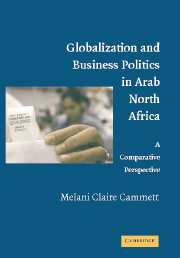Book contents
- Frontmatter
- Contents
- List of Tables and Figures
- Acknowledgments
- List of Abbreviations
- Map of Morocco
- Map of Tunisia
- I THE FRAMEWORK
- 1 Rethinking Globalization and Business Politics
- 2 Globalization and Integration in International Apparel Manufacturing Networks: The New Politics of Industrial Development
- II THE INSTITUTIONAL CONTEXT
- III GLOBALIZATION AND INSTITUTIONAL CHANGE
- Appendix A Methodological Note and List of Interviewees
- Appendix B Standardized Questionnaire for Textile and Apparel Industrialists and Factory Managers
- Bibliography
- Index
2 - Globalization and Integration in International Apparel Manufacturing Networks: The New Politics of Industrial Development
Published online by Cambridge University Press: 23 December 2009
- Frontmatter
- Contents
- List of Tables and Figures
- Acknowledgments
- List of Abbreviations
- Map of Morocco
- Map of Tunisia
- I THE FRAMEWORK
- 1 Rethinking Globalization and Business Politics
- 2 Globalization and Integration in International Apparel Manufacturing Networks: The New Politics of Industrial Development
- II THE INSTITUTIONAL CONTEXT
- III GLOBALIZATION AND INSTITUTIONAL CHANGE
- Appendix A Methodological Note and List of Interviewees
- Appendix B Standardized Questionnaire for Textile and Apparel Industrialists and Factory Managers
- Bibliography
- Index
Summary
The textile and apparel sectors are important sites for examining how integration in globalized manufacturing affects business politics in developing countries. The apparel industry engages almost every country in the world and is at the forefront of globalization processes. Since the 1970s, more and more developing countries have participated in textile and apparel manufacturing chains, and competition for market share is acute. Trends in textile and apparel production and sourcing since the 1980s have created a new global production context, introducing new inducements for producers in developing countries to integrate in global manufacturing chains and to form alliances with local producers. Large multinational retailers and buyers now encourage developing countries to adopt full-package production, a subcontracting arrangement in which manufacturers receive detailed specifications from buyers, acquire all inputs, and coordinate most phases of production (Bair and Gereffi 2001; Scott 2002). In response, developing country officials and producers emphasize their national and regional capacity to carry out full-package production and promote industrial development based on clustering. This chapter traces the evolving global production context of the apparel supply chain to show how it has reshaped the repertoire of industrial development strategies for producers and officials in developing countries such as Morocco and Tunisia. The structure of global apparel manufacturing frames debates about industrial upgrading but does not determine the policies and strategic behavior of actors in developing countries. As chapters 5 and 6 show, producers and business associations in the two countries responded differently to these shared global constraints and opportunities.
- Type
- Chapter
- Information
- Globalization and Business Politics in Arab North AfricaA Comparative Perspective, pp. 25 - 52Publisher: Cambridge University PressPrint publication year: 2007



